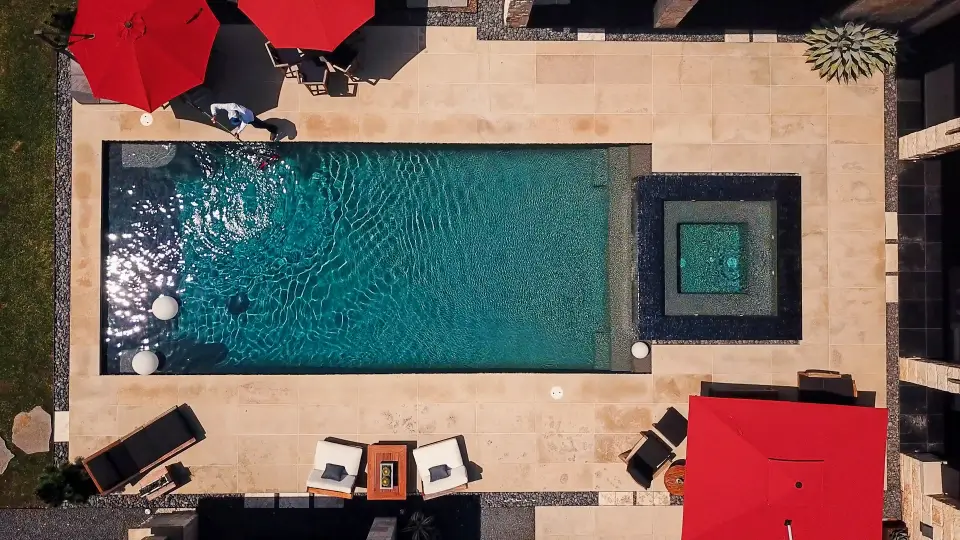
Without a clear, consistent maintenance routine for swimming pools in DFW, the water appears cloudy, algae spreads, and equipment strains under preventable issues. That’s why we made a weekly pool maintenance checklist to help homeowners keep their pool water safe and clean.
If it seems like a lot, it’s because it is. Great pool care requires a lot of work. When you’re ready to hire a pool professional to handle it for you, call our team at Integrity Pools.
The Importance of a Weekly Pool Maintenance Checklist
In the DFW area, skipping even a week can mean algae growth, cloudy water, or costly repairs.
The “3 C’s of pool care” are simple to remember:
- Circulation – Proper circulation prevents stagnant water and buildup.
- Cleaning – Removing dirt and debris protects pool surfaces and water clarity.
- Chemistry – Balanced chemical levels keep your pool safe for swimming.
Having a weekly maintenance plan ensures each of these areas is covered consistently.
Step 1: Skim and Remove Floating Debris
Leaves, bugs, and other debris gather quickly on the water’s surface, especially after Texas storms. Using a skimmer net multiple times a week prevents buildup. Empty the skimmer basket often so your pool pump can keep the water moving with proper circulation.
Step 2: Brush Pool Walls and Surfaces
Brushing keeps the pool clean and helps prevent stains. Use a pool brush on the walls, steps, floor, and tile line at least once a week to prevent algae growth and protect surfaces from discoloration.
Step 3: Vacuum the Pool Floor
Even with good circulation, dirt settles on the floor. A pool vacuum or automatic pool cleaner helps collect debris from corners and low spots.
Step 4: Check Water Level
North Texas heat causes water to evaporate faster than in cooler climates. Water that’s too low can damage the pump, while water that’s too high is harder to skim. Use a garden hose to keep water level within the ideal range.
Step 5: Test Water Chemistry
Consistent testing is the foundation of a healthy pool that’s swim ready all season long. At least once a week, check:
- pH level
- Free chlorine
- Total alkalinity
- Calcium hardness
- Cyanuric acid (stabilizer)
- Salt levels for a saltwater pool
Keeping water chemistry within the ideal range prevents skin irritation, equipment damage, and costly fixes later.
Step 6: Balance Chemical Levels
After testing, adjust chemicals to maintain balance. Low chlorine levels or improper pH often cause cloudy water. Sometimes, you’ll need to shock the pool with a high dose of chlorine to eliminate bacteria.
Step 7: Run the Pool Pump and Filtration System
Your filtration system is what keeps your pool water circulating. In DFW’s hot climate, pumps often need to run multiple times daily to keep water moving. Follow the manufacturer’s guidelines for run time.
Step 8: Clean and Check Filters
Pool filters trap small particles that skimmers and vacuums miss. Whether you have a cartridge filter, DE filter, or sand filter, regular cleaning is necessary. Perform a filter check, rinse or backwash when filter pressure rises, and replace parts as needed to prevents clogs and keep water clear.
Step 9: Inspect Pool Equipment
Weekly equipment checks prevent surprise breakdowns. Inspect your pool jets, pump, heater, automatic cleaners, and safety gear. Look for leaks, unusual sounds, or weak circulation.
Step 10: Review Safety Equipment
Pool maintenance isn’t just about water quality—it’s about safety too.
Common safety items include:
- Pool safety cover (different from a standard cover; designed to prevent falls)
- Fencing or gates around the pool with self-latching locks (often required by code in DFW)
- Pool alarms (surface wave alarms or gate alarms)
- Life ring or rescue hook
- First aid kit in the pool area
- Non-slip surfaces or mats around the pool deck
- Pool lighting (for safe evening use)
Inspect these regularly to ensure peace of mind during the busy swimming season.
Download Our Checklist
Click here to download and print the full checklist or save it on your phone and have it handy while you’re doing maintenance tasks.
DIY vs Professional Pool Service in Dallas/Fort Worth
Some pool owners handle their own maintenance tasks, but it comes with hidden costs. DIY requires test kits, chemicals, cleaning tools, and hours of work each week.
By comparison, professional pool cleaning service provides:
- Precise chemical balance.
- Thorough equipment checks.
- Cleaning of pool walls, floor, and deck.
- Proper use of chemicals to prevent buildup.
For many families, hiring experts is more cost-effective than managing a full maintenance checklist alone.
The Benefits of Hiring Integrity Pools
Our weekly service covers every detail, from brushing surfaces to balancing chemicals.
When you trust us with your swimming pool, you gain:
- Local expertise in Dallas/Fort Worth pool maintenance.
- Professional care for the entire pool system and all equipment.
- Confidence that your pool is not just clean, but properly balanced and safe.
We also provide other professional maintenance services, including leak detection services, pool equipment repair, and pool filter cleaning. Our goal with routine maintenance is to help keep your pool clean and avoid expensive repairs with regular, professional checks.

Keep Your Pool Clean with Integrity Pools
If you’d rather spend your weekends enjoying the water instead of scrubbing pool surfaces and adjusting chemical levels, our team is here to help. Contact us today for professional weekly pool service in Dallas, Fort Worth, or nearby cities.
